What Is a Plant Based Diet (Explanation, Answers, Examples for Beginners)?
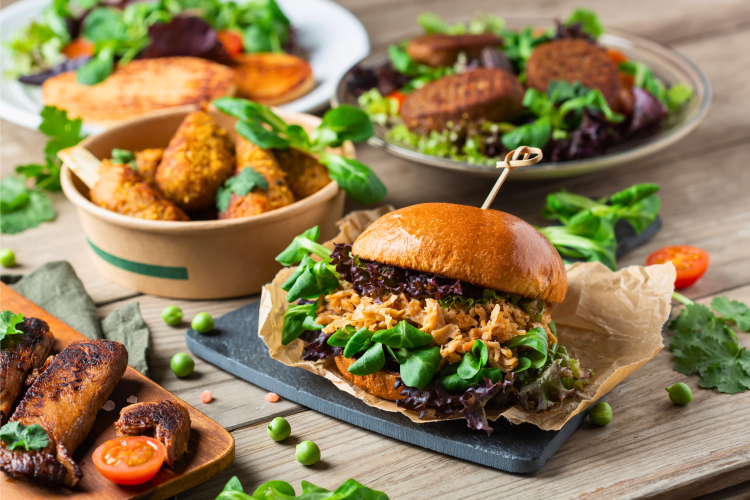
Plant-based diets are some of the healthiest ways to eat, indulging fully in the wealth of the natural world to nourish and sustain. While there are many different varieties of eating that fall under the plant-based diet umbrella, such as vegetarian, pescatarian and vegan, the greater terminology includes those diets that place plant-based foods at the center, rather than just a component, of eating. Popular plant-based foods and ingredients include vegetables, fruits, seeds, nuts and grains. Other animal-sourced foods like red meat, poultry, fish, eggs and dairy are avoided completely or used only in small amounts.
Eating a plant-based diet, whatever its variety or restrictions, has been found to improve overall health, including minimizing things like cancer risk, diabetes and autoimmune issues, as exposing the body to a greater variety of nutrients and vitamins than some more omnivorous diets. Adopting plant-based diets can also relate to ethical concerns on eating animals or the environmental impact of harvesting or farming animals for food. Whether you’re looking to change your diet or just looking for a way to bring more plant-based foods into your meal plans, we’ve included many of the benefits, strategies and food options of a well-rounded plant-based diet plan.
Jump to Section
- What Is a Plant-Based Diet?
- 10 Benefits of a Plant-Based Diet
- What Are the Negatives of a Plant-Based Diet?
- Plant-Based Diet Food List
- What Is a Plant-Based Diet FAQs
What Is a Plant-Based Diet?
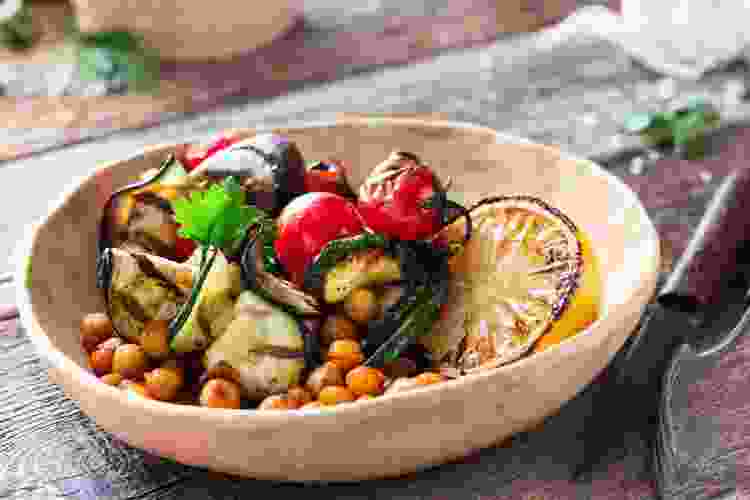
Many plant-based diets are rooted in the avoidance of animal foods and by-products or the minimization of them in favor of other plant-based foods. Many adopters implement a method called the Two-Thirds Rule, which dictates that your diet should get the majority of its bulk on a plate or in a dish from plant-based materials, with only a third deriving from animals. The vegan diet, perhaps the most strict of all these, would contain no meat, eggs or dairy, but would compose a plate with 100 percent plant-based foods. Pescatarians, who avoid all meats with the exception of fish, would favor a meal that contains one-third fish or other seafood and two-thirds plant-based elements.
What Is an Example of a Plant-Based Diet?
Vegan diets, some of the more stringent plant-based diets, avoid all animal products. This includes meat, fish, poultry, eggs and dairy. It may also include avoidance of elements like honey or gelatin derived from animals. Vegan food often gets the bulk of its protein from foods like seeds, nuts and tofu. A vegetarian diet, on the other hand, typically avoids meat, fish and poultry, but may allow eggs and dairy. For plant-based eaters in general that allow some animal products, they are typically used sparingly and not as the center of the meal. For many who enjoy a plant-based diet, there is an emphasis on foods that are closer to nature, which means limiting things like refined sugars and processed foods, with an emphasis on whole ingredients.
10 Benefits of a Plant-Based Diet
1. Better Heart Health

Plant-based diets, according to the National Library of Medicine, have been proven to lower cholesterol, blood pressure and contribute to overall heart health by limiting the saturated fats that often come with meat and dairy consumption.
2. Less Chance of Diet-Related Complications
A plant-based diet has also been linked to lessening chances of developing chronic diseases, like diabetes, helping to regulate blood sugar and maintain a healthier weight.
3. Reducing the Impact of Autoimmune Disorders
Many with autoimmune diseases have found that a plant-based diet helps fight bodily inflammation that results from consuming animal products, especially things like refined grains, sugars and dairy.
4. Ethical Considerations
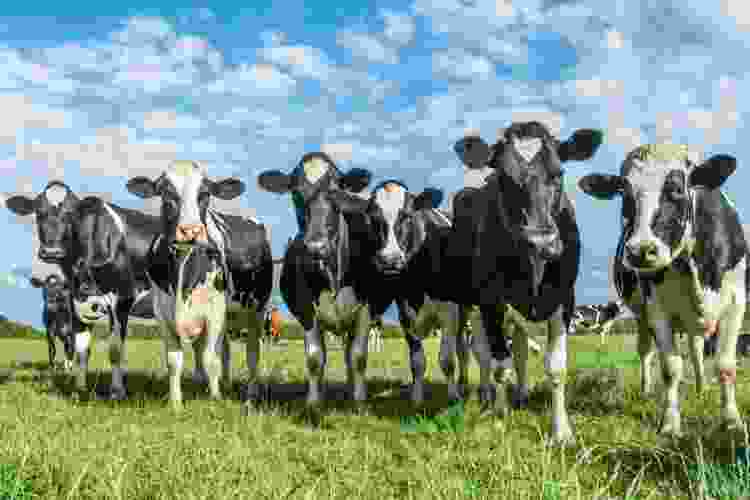
Many people decide to adopt a plant-based diet from a place of compassion towards the welfare of animals, which are often cruelly treated in the farming and meatpacking industry, resulting in bad conditions for the animals they raise and ready for consumption.
5. Environmental Factors
Many choose a plant-based diet, since eating more plant-based foods has less overall impact on the environment than eating meat, whose history of farming and processing is often at odds with environmental concerns like greenhouse gas emissions, land management, refrigeration and shipping/ transformation that can have environmental impact. The chemicals and hormones often used in the meat industry can also lead to a desire to avoid animal products.
6. Expense
While plant-based foods are not always less expensive than animal-based diets, many products like meat and eggs can be more expensive than common plant-based foods like grains, beans and legumes, which can often be bought in bulk and are shelf stable.
7. Digestive Health

Plant-based diets are often associated with greater digestive health. They largely avoid many of the products, like dairy, that many have intolerances to while increasing the amount of fiber one consumes in veggies, fruit and grains.
8. Diversity of Foods
With an emphasis on multiple plant-based foods and the minimization of processed and refined foods, a plant-based diet can often include more nutritional elements like antioxidants, vitamins and magnesium than meat-based diets. A more varied diet can mean less nutritional shortages in the body and better health overall.
9. Immune Boost
Consumption of a wide variety of plant-based foods can have a positive impact on the immune system, taking advantage of the antioxidants and phytochemicals found in leafy and root vegetables like onions and garlic, which have been shown to help reduce the severity of illnesses and the risk of developing illness like cancer and autoimmune diseases.
10. Creativity

With a wide variety of foods avoided that commonly make up the average omnivore diet, there are great opportunities to use foods in new ways and experiment in the kitchen with fresh and interesting ingredients that are plant-based. Vegan food ideas often employ clever substitutes for getting the taste and texture of common foods without using animal products resulting in innovations in everything from vegan breakfast food to vegan soul food.
What Are the Negatives of a Plant-Based Diet?
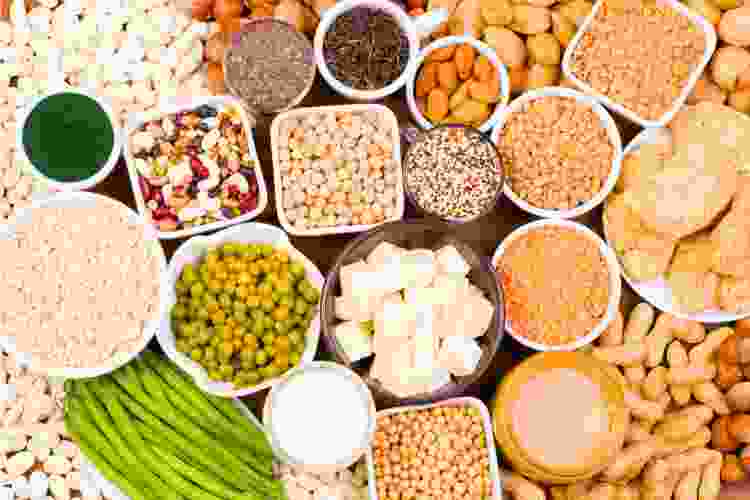
Because plant-based diets often eliminate many common sources of protein like meat and eggs, replacing these foods with other options like nuts and tofu can sometimes be a challenge. When done poorly, restrictions can result in an unbalanced diet. Common issues include iron deficiency from lack of red meat and calcium shortages when all dairy is eliminated. Since things like omega-3 fatty acids are often found primarily in fish, omitting it from your diet can make it harder to find substitutes. There can also be problems with taking in too much dietary fiber that irritates the digestive tract, leading to issues like bloating and abdominal discomfort.
Plant-Based Foods to Avoid
Many people who decide to undertake a plant-based diet look to the wrong kinds of foods once they have eliminated some of the staples of the omnivore diet from their cooking, turning instead to processed foods like meat and dairy substitutes, packaged vegan snacks and complex carbs. While these foods can be enjoyed in moderation, an emphasis on more natural and unprocessed foods can be far healthier and more nourishing. This includes avoiding eating too many foods with refined grains and processed sugars commonly found in many otherwise plant-based foods like fruit juices, coffee creamers and plan-based snacks that involve a lot of sodium.
Plant-Based Diet Food List
Whatever your plan to introduce more plant-based foods into your diet, there are many cooking and ingredient staples enjoyed by those adopting plant-based, vegan and vegetarian meal plans. Follow the list below to see what these include.
1. Leafy Greens
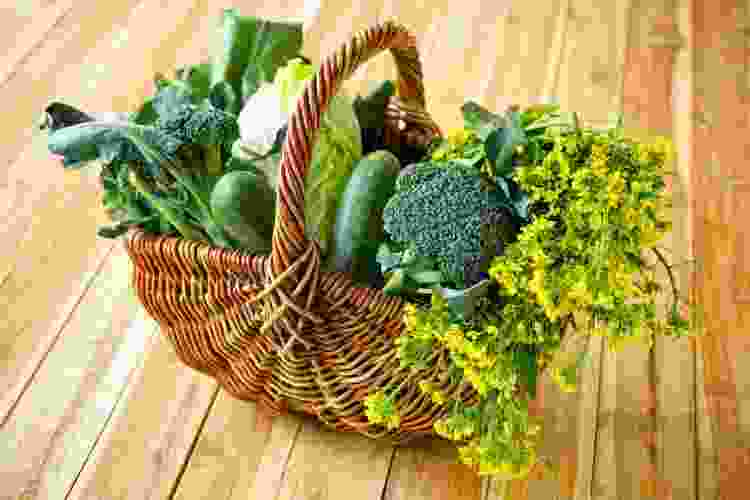
Leafy greens are often a centerpiece of a plant-based diet, due to their abundance and variety, as well as their adaptability to be served fresh, cooked and ground into things like sauces and smoothies. Great options include lettuces, cabbages, kale and collard greens.
2. Root Vegetables
These subterranean veggies are usually stuffed with phytochemicals and vitamins. They include potatoes, sweet potatoes, onions, beets and garlic, all of which are a staple in any plant-based diet.
3. Fruits
One of the most popular options for snacking and desserts in a plant-based diet, fruit boasts many nutritional benefits. Bananas have large amounts of potassium while berries boast antioxidants. Citrus foods are also known for their wealth of nutrients like Vitamin C and antioxidants. Tomatoes are also a fruit that are a common staple in a plant-based diet, with endless adaptability on how to use them.
4. Legumes
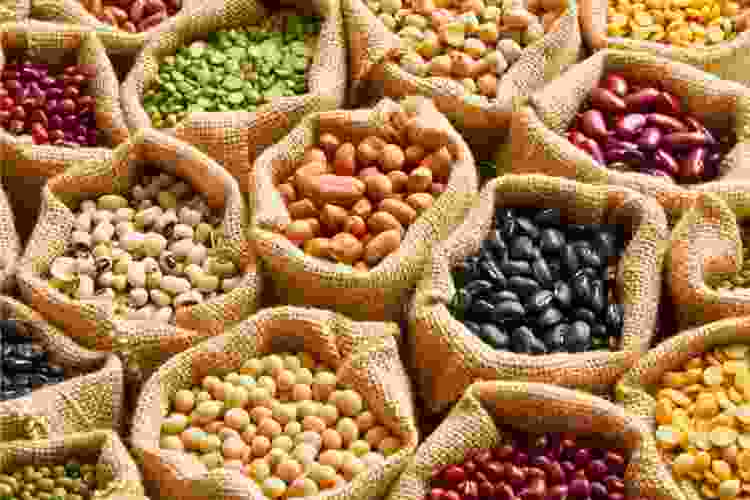
This family of foods, which includes beans, lentils, chickpeas and peanuts, are known for their abundance of plant-based protein, making them an excellent alternative to meat with abundant fiber.
5. Whole Grains
Whole grains in general are plant-based, though many plant-based eaters gravitate toward whole grains like oatmeal, buckwheat and quinoa over more refined grains like ground corn or white flour. This means that bread and pasta, unless they incorporate eggs, can be enjoyed on a vegan or plant-based diet.
6. Tofu
This soy product is a popular ingredient in many Asian cuisines and is often used as a popular substitute for meat. Tofu is known for taking on the flavor of whatever it is cooked with, so it's great to add bulk and additional protein to dishes made without meats, poultry or fish.
7. Plant-Based Milks
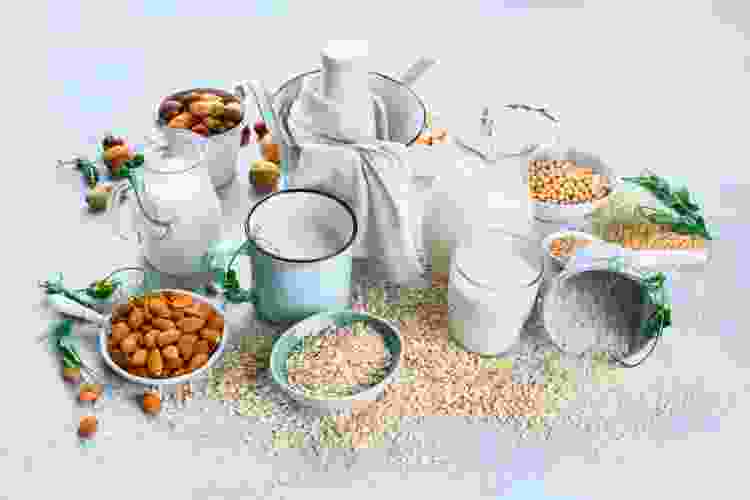
While the origins of cow or goats milk eliminate them from a plant-based diet, there are many other milk options, which can be used for drinking, cooking or adding to your coffee. Oat milk and soy milk are created from plant-based materials and are popular among those avoiding animal milk. Cashew and coconut milk are also great non-dairy milk options you can use for cooking, or for your latte.
8. Nuts & Seeds
Nuts are a source of protein and good fats and can be an important part of a plant-based diet, either as snacks or as a cooking ingredient. This is also true of seeds, like sunflower seeds, flaxseed and chia seeds, which have health benefits when added to dishes. Nut butter, like cashew butter, almond butter and peanut butter are often much-used in plant-based recipes.
9. Sweeteners
While sugar is a plant-based food, many eating a plant-based diet try to limit their exposure to refined sugars like corn syrup and sucrose, instead using raw sugars or molasses. Some plant-based eaters will still use honey, which is an animal product, but is often favored as an alternative to other sugars. Others following a vegan or plant-based diet prefer to use maple syrup, coconut sugar or agave nectar.
What Is a Plant-Based Diet FAQs
Can I Eat Eggs on a Plant-Based Diet?
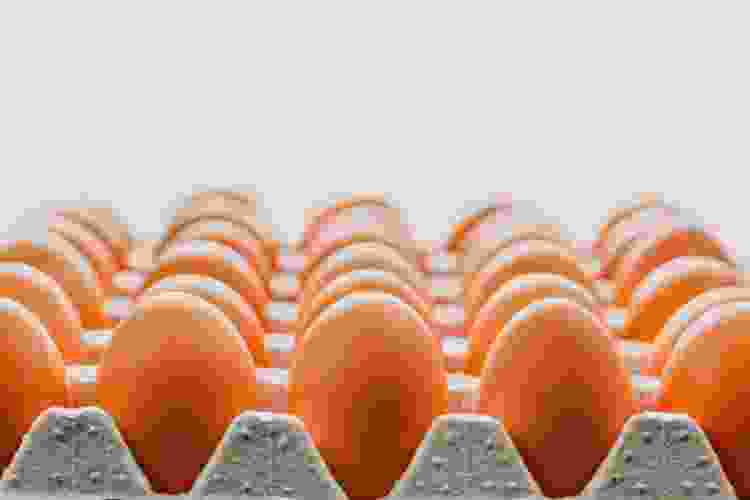
Eggs, as an animal product, are typically limited or restricted in a plant-based diet due to their poultry origins. They can, however, be a great substitute for red meats, fish and poultry if you are looking for a protein source and are not sticking to a strictly vegan diet.
Can You Eat Cheese on a Plant-Based Diet?
Many plant-based diets restrict cheese and other dairy-origin products due to their animal-based source. Many non-vegan plant-based diets however, may use small amounts of cheese in dishes.
Can You Eat Bread on a Plant-Based Diet?
Depending on the level of restriction of animal products in your diet, some breads are more plant-based than others. Vegan-friendly breads are typically made without eggs or flour among the ingredients and are often sold as an alternative to other breads. Traditional sourdough, which is made with flour, water and salt is a vegan-friendly bread provided it doesn't have additives like cheese or milk added to the dough. Plant-based diets tend to favor whole grain breads over white and other more processed breads.
The benefits and staples of a plant-based diet can be a great way to think about what you eat, the health benefits, and the environmental impact of your diet.
For even more fun ideas to kickstart your healthy living, check out other experiences happening on Classpop!

